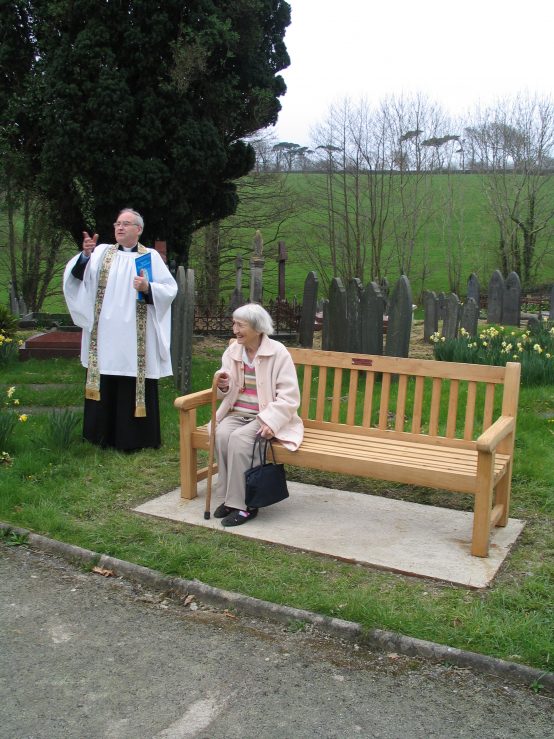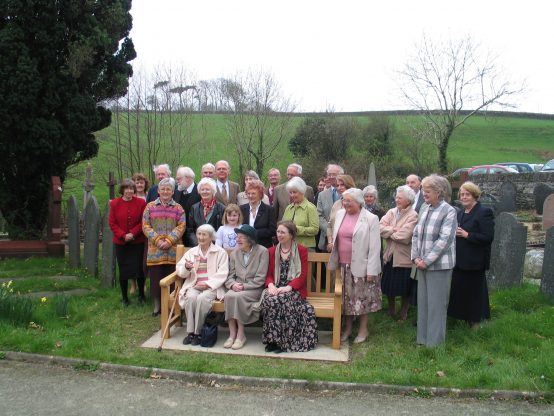by the Curious Scribbler
We all knew Storm Darragh was on its way, and when it arrived it certainly lived up to the Met Office predictions. The wind roared from the small hours on Saturday morning and continued, varying only slightly in violence all through the day. Violent rainstorms came and went, stinging the face as they were delivered horizontally by the wind. Towards evening the direction veered a little and only then did my handsome thirty year old Nordmann fir, which had been tossing its boughs all day without breaking them, suddenly and catastrophically toppled into the road. It didn’t immediately inconvenience many motorists for the road was already blocked in three other places, two by floods and one by a fallen oak.
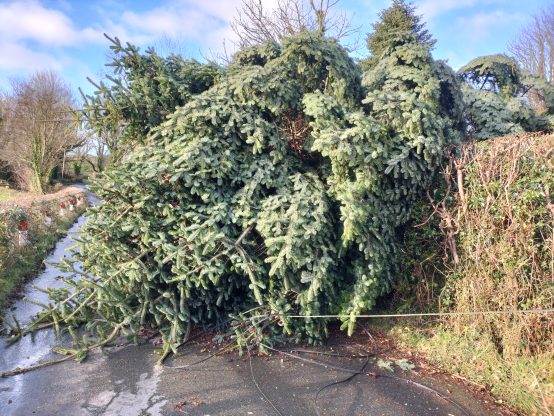
Farewell my Nordmann Fir
Possibly more surprising was how totally the widespread loss of electricity disrupts 21st century life. When the power went down on Saturday morning we didn’t just lose heat and light. The router stopped working, the internet disappeared and the phone, which is now delivered by the router rather than a copper wire, ceases to work too. So we reached for our mobile phones only to find there was no signal, because the booster mast which delivers it was also lacking power. Only by driving up the road to a different location was contact with the world restored via 4G.
Venturing into Aberystwyth we found the whole town without light except for a few emergency lights above the back doors into some of the bigger stores. The traffic lights were off. And absolutely every shop was closed. Clusters of disconsolate students roamed around the closed convenience stores. In yesteryear a few small shops where the shopkeeper lived on the premises would have been open. But tills don’t work without electricity and cards cannot be read. The cashless society is totally dependent of electricity. Those of us who have lived here for many years have the resources to weather a power cut comfortably: log burners, camping gas cylinders, candles and lamps. We cook our meals, and play scrabble by firelight until power is restored. The bedrooms do cool down rather. Central heating requires electricity to circulate the water. But for the all-electric home a power cut must be very bleak indeed.
Even bleaker is a flood. Unusually, the Ystwyth seems to have flooded more severely than the Rheidol, where the flood-plain playing fields became merely rather wet. The Ystwyth and the Paith, which drains into it, flooded spectacularly, creating a single sheet of water from Tanybwlch beach to to Gosen. I have stolen Alan Chamberlain’s photo from a Facebook post.
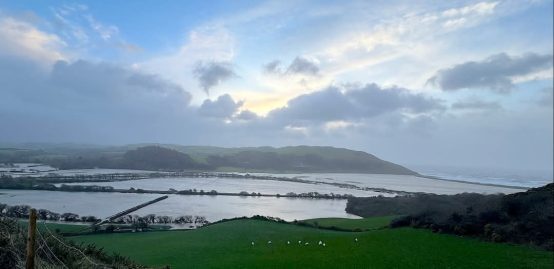
Alan Chamberlain’s photo of the Tanybwlch flats on Saturday 7 December
By Saturday afternoon the roadworks at Gosen were underwater, the plastic barriers bobbing in the flood, the metal ones collapsed under the water. The lovely old house, Tynlone, was flooded. It must be over 30 years since I’ve seen the river quite so full. The water receded overnight leaving the usual mire of silt. Only the field closest to Tanybwlch beach, which really wants to become a saltmarsh, remained deeply flooded by Sunday evening.

Devastation at Gosen
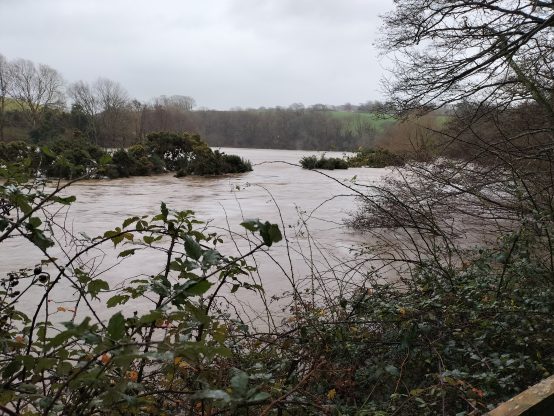
The swollen River Ystwyth by Llanychaiarn Church
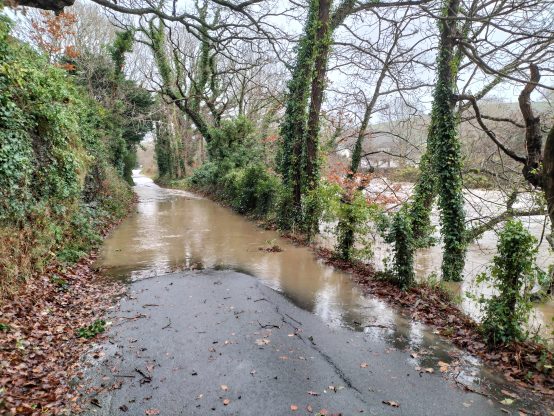
Highest road flooding I can remember
By Monday only the field closest to Tanybwlch beach, which really wants to become a saltmarsh, remained deeply flooded. The dog was pleased to walk the length of the strand. There was less change here than I had expected, only in one place had a fresh load of beach pebbles been taken right over the bar to cascade into the river. On the seaward side the Sea Sandwort Honkenya peploides has taken a hammering, the mat of rhizomes and stolons which stabilize the sand has been much reduced and the big quarry stones arranged to protect the shore have moved even further down the beach. At the south end the sea had left huge heaps of bladder wrack and laminaria, piled more than knee deep along the strand line. Plenty of marine life had been scooped from the sea bottom by the violent waves. Creatures seldom seen have been thrown up by this storm. Another contributor to Facebook Ceredigion Birds and Wildlife has posted a selection of finds: lobster, crab and crayfish on the strandline at Aberaeron. I particularly note the Sponge Crab Dromia vulgaris. This animal is covered in coconut-coloured hairs except where it bright pink pincers protrude, as if it were wearing nail varnish. It picks up sea sponges to wear on the shell like a cloak, using a pair of specially modified hind legs to do so. I had no idea this species was native to our coast – I thought it belonged in the Mediterranean. But then the sea has been getting warmer, as well as the storms more violent.
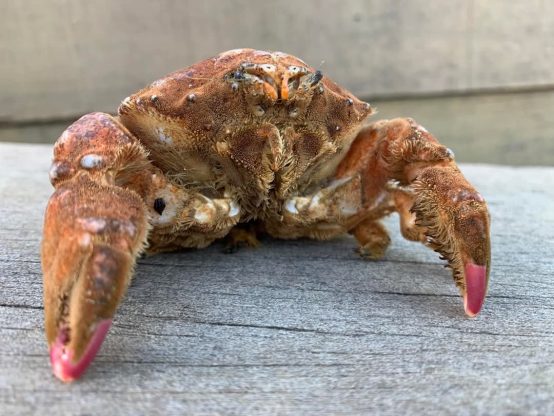
Melissa Lilley posted this picture of a Sponge Crab among the debris washed up on Aberaeron North Beach
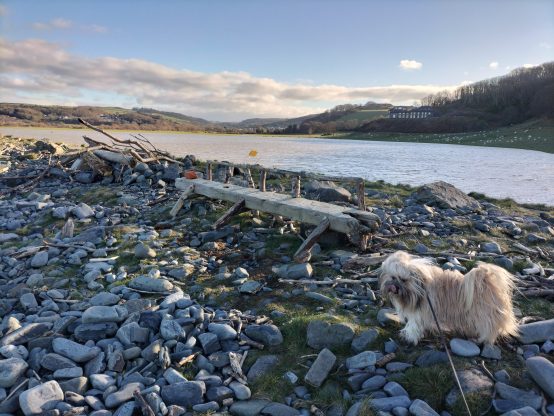
The sheep had very little space to graze, but rustic seat on the Tanybwlch strand proved stronger than it looks.
It has been a week of total calm since Monday and the clear-up is ongoing. Restoring our phone and internet has been a long job; both the fallen trees on our road took down the lines with a vengeance, but it was encouraging to find that by Tuesday several vans of Openreach engineers were tackling the job. Today is Thursday and Letter from Aberystwyth can reach the world.

